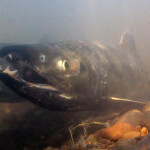The incorporation of more plant-based ingredients within fish feeds could have an impact on the health benefits consumers gain from eating certain types of seafood, a new analysis from the Johns Hopkins Center for a Livable Future (CLF) suggests.
An industry shift toward the use of more plant-based fish feeds has been observed over the years, noted the analysts, with twice as much soybean meal being utilized in commercial aquaculture feed in 2008 as compared to fishmeal. Feed forecasts indicate that crop-based ingredients will continue to rise in popularity through the latter part of this decade, with their utilization expected to increase by 24 percent between 2008 and 2020.
Keeping this in mind – while also recognizing that most farmed fish receive their health-promoting EPA and DHA from consuming fish feeds and specifically fish oil – the Johns Hopkins researchers set out to review the changes in fatty acid and omega-3 content that might occur when utilizing plant-based feeds.
"Farmed fish get their health-promoting omega-3 fatty acids, EPA and DHA, from their feed, and specifically from fish oil," said study leader Jillian Fry, the director of CLF's Public Health and Sustainable Aquaculture Project and a faculty member at Johns Hopkins' Bloomberg School of Public Health. "Our review found that increasing plant-based ingredients can change the fatty acid content in farmed fish, which can affect human nutrition."
Fry and her team, which included colleagues from the University of Minnesota's Institute on the Environment and McGill University, reviewed aquaculture and public health literature and conducted a new analysis to estimate the environmental footprint for the top five crops (corn, wheat, soy, etc.) used in commercial aquaculture feed. What they discovered is that while a shift towards plant-based feeds is considered environmentally sound for the most part, replacing fish oil with vegetable oil in feeds changes the fatty acid content of fish and therefore the nutritional value for human consumption.
Because consumers in America are encouraged to eat more seafood high in omega-3 fatty acids, the review’s findings have large implications for dietary recommendations and the aquaculture industry, according to the researchers.
"The nutritional content of farmed fish should be monitored," noted Fry. "The aquaculture industry should assess the environmental footprint and public health impacts of their crop-based feed ingredients and seek those produced using sustainable methods."
Some environmental consequences could also affect the creation and use of plant-based fish feeds, according to the study.
“Depending on where and how feed crops are produced, plant-based fish feed could be indirectly linked to negative health outcomes for agricultural workers and nearby communities due to exposure to air, water or soil contaminated by nutrients and/or pesticides," the study posited.






